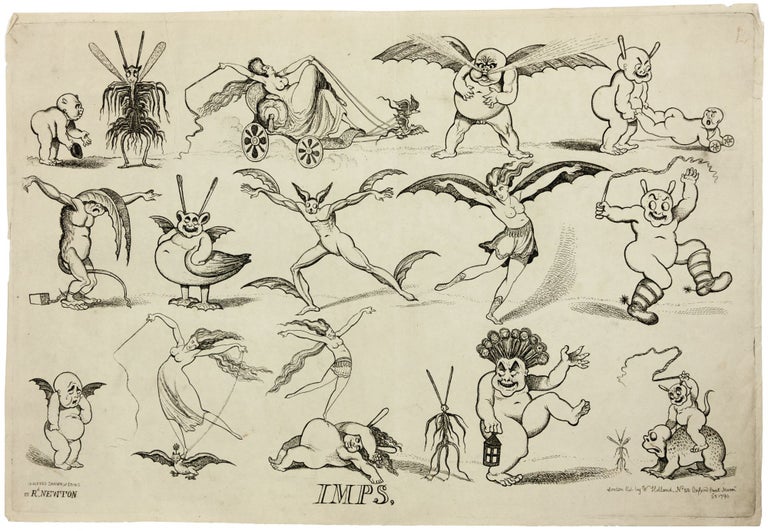
Imps.
Folio etching [44.6 cm 30.1 cm the platemark], (1) single-sided sheet. Narrow margins, early paper backing, small mend at upper right edge, remnants of matting tape on back, verso with the ink stamp of the collection of Eduard Fuchs (1870-1940) in Berlin (see below), a fine strike of this rare etching. Very rare (and highly unusual) separately issued satirical etching by Robert Newton (1777-98), the prodigious but short-lived English caricaturist who worked during the era of the great cartoonists James Gillray (1756-1815) and Thomas Rowlandson (1756-1827). The etching, titled Imps, depicts, in three rows, some 20 fanciful designs for spritely demons, ranging from the buxom to the bizarre. We have been unable to locate a published interpretation of this understudied print, but it seems clear that Newton is here mocking the contemporary early-Romantic interest in ‘fairy painting’ by such artists a Henry Fuseli (1774-1825) and William Blake (1757-1827), especially their well-known interpretations of Shakespeare’s A Midsummer Night’s Dream and Fuseli’s highly sexualized depictions of nightmares. In London Newton worked closely with the radical publisher William Holland (1757-1834), to whom he was likely apprenticed as a boy, producing nearly 300 single-sheet prints before he died of typhus at the age of 21. Newton spared no one in his satirical designs, but he is especially remembered for his bawdiness and as a fierce critic of slavery. Newton, in anticipation of 20th-century comics, often produced work with multiple small panels and speech bubbles. The present example of Newton’s Imps, as can be seen by the ownership stamp on the print’s verso, was once part of the collection of the famed German Marxist scholar of visual culture, art collector, and political activist Eduard Fuchs (1870-1940). A highly prolific writer, Fuchs is remembered for his radical journalism and his numerous volumes on the political implications of caricature as a medium. His works include monographs on Daumier and Gavarni, as well as a history of the (pernicious) depiction of Jews in caricature (Die Juden in der Karikatur, 1921). Fuchs was among the first writers to revive Richard Newton’s work, which he discussed and illustrated in his 3-volume study of erotic art and his book on caricatures of women (Geschichte der erotischen Kunst [1908-26] and Die Frau in der Karikatur [1906]). The collection of Fuchs, who was exiled at the rise of Hitler to power in 1933, was the focus of a 1937 study by the philosopher and social critic Walter Benjamin (“Eduard Fuchs, der Sammler und der Historiker,” Zeitschrift für Sozialforschung, vol. 6 (1937), pp. 346-81). OCLC and KVK identify no institutional copies of Newton’s Imps. D. S. Alexander, in his exhibition catalogue of Newton’s work, cites only the example at the Bibliothèque nationale de France. Imps is not represented among the Newton prints at the two principal U.S. repositories of British caricature, the Huntington Library and the Lewis Walpole Library. * D. S. Alexander, Richard Newton and the English Caricature in the 1790s, p. 155, no. 227.
Sold
